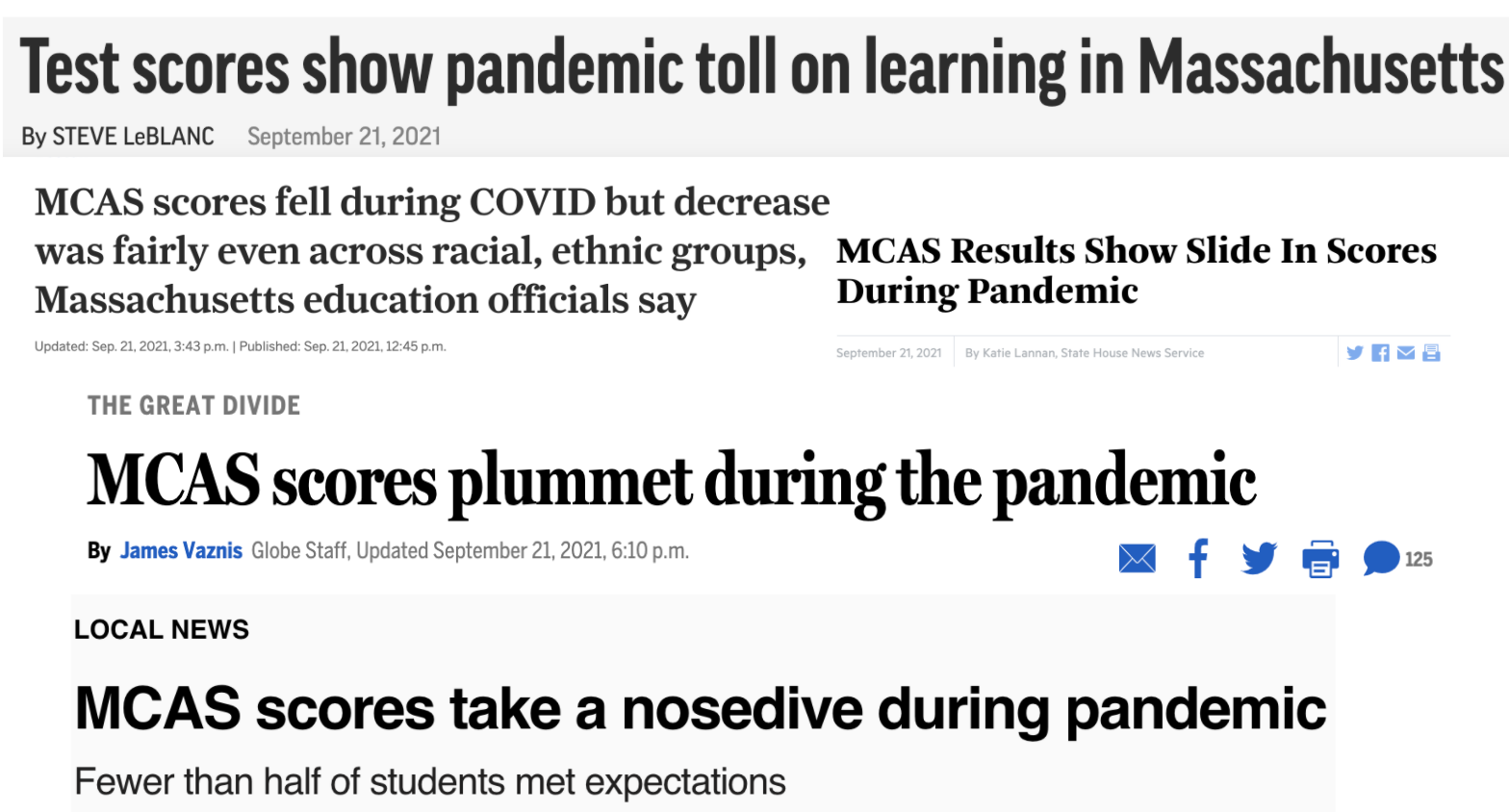FYI from BSF, 09.24.21
Common Assessments (Part I)
Didn’t have to be a close reader to get the message this week.
The state released results from the spring 2021 MCAS earlier on Tuesday. The tests were shortened, and the 10th grade exam was not required for graduation. Despite the complexity of administering the exam during the pandemic, participation rates, statewide, were relatively high.
There is a lot to unpack, but there are four initakeaways from the data.
School works.
Don’t skip over the obvious point - if there was an open question around whether or not standardized assessments reflected student learning in some way, these results provide a response. School was interrupted and so achievement dropped, fairly equally across subgroups. If achievement were solely a reflection of backgrounds, the data wouldn’t look like this. School and school quality matters.
The question now is what we do about it
Results in Massachusetts and Boston reflect trends seen nationally.
Namely, declines in reading proficiency and even more significant declines in math proficiency.
This pattern has been clear from the beginning of the pandemic in national assessments, and is visible in state level data now (example).
The stubbornness of moving reading proficiency is well-documented; however, there is evidence of the ability to move math proficiency quickly through research-backed practices.
What will be the plan for Boston? Math proficiency was not addressed in system planning for the school-year or the application for federal funding (although several of our Recentering grantees have plans).
It will be difficult to leverage Boston high school data to address learning needs.
Participation rates for Boston high school students, across all subgroups, was significantly lower than the Massachusetts average, limiting the usefulness of the data.
High school participation rates were even lower than relative to grades 3-8 in Boston (91% participation). Is this the result of disengagement at the high school level last year? The dropping of the graduation requirement?
However, this did not manifest in a large decline. Why? Proficiency in Boston had already dropped significantly in 2019 when the state reset high school standards and the 10th grade MCAS.
There is alarming data for subgroups in Boston.
Achievement gaps increased along lines of race, language, and ability from 2019 to 2021. Keeping in mind that Boston Public Schools enrolled 48,112 children last year...
Almost 3 out of 4 non-white students did not meet expectations in literacy in grades 3-8…
In grades 4-8, no Black child exceeded expectations in math or science…
In grade 8, no Latino child had exceeded expectations in science...
Debate opened up this past week around MCAS and race. Rather than ignoring or qualifying the data points above, they demand to be interrogated.
More to come next week.
Reopening Boston, MA, and Beyond
Boston School Committee met for the first time during the 2021-2022 school-year. Full agenda, but the beginning was dominated by the evergreen topic of buses. Materials are not available online from the presentation, but here is what was shared:
On-time data for the mornings appears to be improving; afternoon data was limited, but appears significantly worse than the morning. This is not just an operational headache - there are academic and emotional consequences. Cities around the country are trying innovative approaches to solve this problem. Boston is calling for a working group to study the issue.
There was a lot of other information on the start of school, including health and safety. There are continued questions around pooled testing, with only 18,000 families enrolled; logistical issues are creating snags in other communities in Massachusetts, too. The district also reported that approximately 1,500 students have been withdrawn because they were enrolled, but have not reported to school. That number of students constitutes over 3% of last year’s enrollment.
Boston School Committee will see a full report on the exam school policy and MCAS data on October 6th - for now the district has emphasized social workersas a key strategy.
Remainder of meeting materials (ESSER, Code of Conduct, libraries) here.
The state board of education also met this week. Despite continued pressure from some families, more remote options do not appear to be on the horizonfrom the state. One Board member raised the question of receivership in Boston. Full agenda here, which includes a MCAS analysis and hefty back-to-school report.
The weekly state report on school-based COVID cases showed an increase in cases (first full week of reporting). This week’s big news of vaccines being imminently available for 5-11 year olds couldn’t come fast enough. It is now officially harder to get into a Bruins game than to enter a Massachusetts school.
States across the country are in a similar boat.
UNICEF data provides an interesting insight - the United States nearly led the world in days of school closures (page 6).
Other Matters
More moves for a more inclusive curriculum in Massachusetts schools.
Congratulations to the Winship elementary school in Brighton - it won the prestigious national Blue Ribbon for academic performance.




